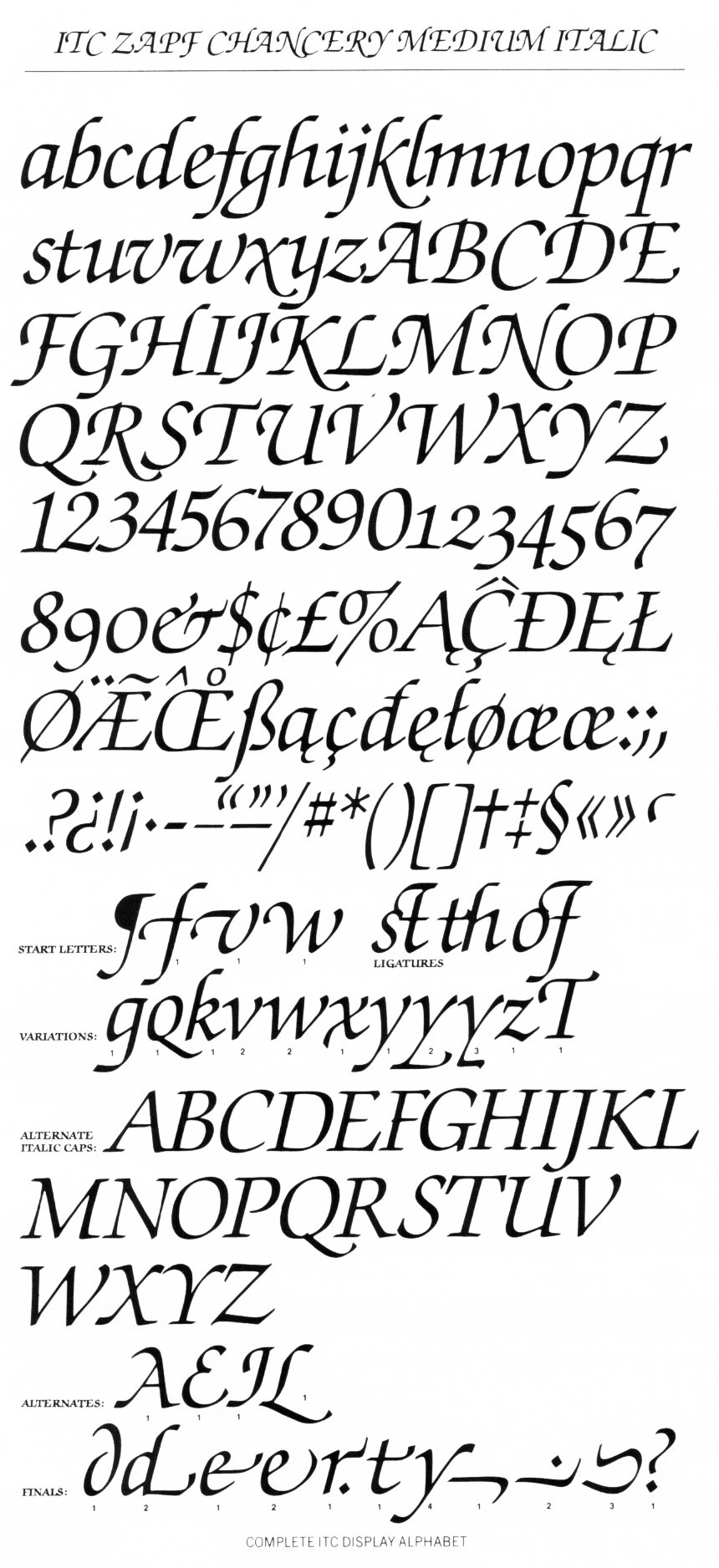Obscure Zapfiana: Zapf Chancery alternate glyphs never digitized

John Butler
Posts: 355
If I recall correctly, Apple or Linotype released a GX Font Pack to promote their new QuickDraw GX type features, later rebranded AAT, and now largely undead but probably still accessible in some character palettes in Pages or Keynote. I had this on a CD or floppy somewhere. In addition to my favorite extended glyphsets ever released for ITC Newtext and Bernhard Modern, they had extended glyphsets for the standard PostScript 35 including Zapf Chancery Medium Italic.
They never added the “Roman” version from the full Zapf Chancery package, which is more of a Less Italic than a “Roman,” and which shines in the title sequence from the early 90s movie Kafka.


They never added the “Roman” version from the full Zapf Chancery package, which is more of a Less Italic than a “Roman,” and which shines in the title sequence from the early 90s movie Kafka.
Years ago at a type conference I bought some 1980s ITC specimen booklets, one of which was Zapf Chancery. Here are all the glyphs drawn for the Demi “roman” weight. Zapf drew “roman” versions in four weights, Light, Medium, Demi and Bold, plus “italic” versions in the Light and Medium; and in each font there were alternate caps and alternate lowercase. In the regular weights, the caps were unswashed and the lowercase were restrained, with the swash uppercase and lowercase alphabets in the alternate position. For a given weight’s “italic” version, the entire font is slanted—whether mechanically or manually I’m not confident enough to judge—and the swashier alternate lowercase and uppercase are swapped into the normal position, with the more restrained versions now alternates. This is a very clever approach!
Finally, the 28-page specimen shows small caps for the non-italic Light and Medium weights. All weights include oldstyle figures. It’s a shame these glyphs still aren’t digitized, as I much prefer the more upright versions to the Light Italic that got played to death courtesy of the venerable Postscript 35.


3
Comments
-
It’s a shame these glyphs still aren’t digitizedThe irony is that the extras – alternates, ligatures, finals, osf – were digitized once, as part of a copy with the pseudonym Zack, by BigFont/FontBank. No idea whether that was legitimate – probably not. In any case, it’s no longer available for licensing, AFAICT.2
-
Berthold also released a version in 1993 named Zapf Chancery Swash BQ. Image Club Graphics had their version in 1992 but I don't know how complete it was.
2 -
Interesting; I know that Berthold’s Palatino digitization disappeared from the market after Berthold’s later “ownership” by the late Mr Hunt. Perhaps someone at Monotype will see fit to dust off and update those forgotten digitizations.
Another presumably digitized “lost” font I’d love to be able to buy one day is François Boltana’s Champion Script, not to be confused with the later excellent but slightly different Champion Script from Parachute.
1 -
Florian, are you sure the Zack knockoff wasn’t just glyphs pirated from the early 90s GX version?
1 -
No, I’m not. Could very well be!
0 -
OT, but @John Butler mentioned it so I did a bit of research about Champion Script.by Panos Vassiliou, as presented at the 3rd International Conference on Typography & Visual Communication - June 2007."The first known attempt to decode Champion’s writing, was done in 1989 by the French typographic designer François Boltana. Later, in his published paper “Ligatures & calligraphie assistée par ordinateur” (1995), he proposed a couple of alphabets, based on Champion, with a minimal set of alternate glyphs (fig 7). These did not really make it into a commercial font as he passed away in 1999.".So Parachute's Champion Script is the closest one can get unless they digitize Boltana's work on their own.
2 -
Thanks! Here’s a link to the PDF itself. There are a few embedded Type 3 fonts; perhaps it’s one of those.
0 -
The Image Club version of Zapf Chancery Swash was based on the glyphs included on the film we obtained (and licensed) from ITC.George Thomas said:Image Club Graphics had their version in 1992 but I don't know how complete it was.
This is the character set from the Type 1 font:
5
Categories
- All Categories
- 46 Introductions
- 3.9K Typeface Design
- 489 Type Design Critiques
- 567 Type Design Software
- 1.1K Type Design Technique & Theory
- 662 Type Business
- 867 Font Technology
- 29 Punchcutting
- 523 Typography
- 120 Type Education
- 325 Type History
- 78 Type Resources
- 112 Lettering and Calligraphy
- 33 Lettering Critiques
- 79 Lettering Technique & Theory
- 563 Announcements
- 94 Events
- 116 Job Postings
- 170 Type Releases
- 182 Miscellaneous News
- 277 About TypeDrawers
- 55 TypeDrawers Announcements
- 120 Suggestions and Bug Reports

